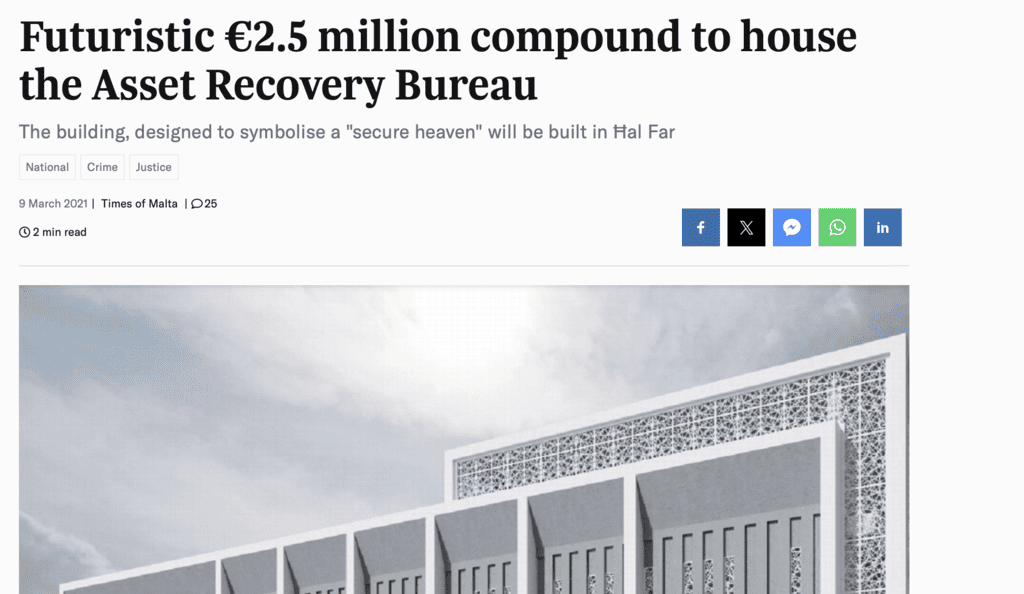In March 2021, the Maltese government was desperate to convince the Financial Action Task Force to remove Malta from the list of “grey”, untrustworthy, financial jurisdictions.
One of the most important targets set to the Maltese government was to show they were serious about recovering assets from criminals. The logic is that criminals want to enjoy their earnings as much as any innocent hard worker. They buy art and cars and jewellery and all manner of objects they use to transform dirty cash into splendid living. If you’re serious about fighting financial crime you need to take the assets obtained from illicit gains away from the criminals.
The Maltese authorities were in the mood to promise anything to the FATF. Read this report of a press conference from the time: they published plans for a palatial warehouse in Ħal Far where, they said, they would be storing all the assets they would be recovering.

It was a wasteful, pointless plan, even at the time. Plans for an expensive building which is little more than a warehouse do not prove that the government has either the ability or the willingness to get serious about asset recovery. It was just a shell. An expensive shell on which they must have spent God knows how much money in architects and designers. But it was hollow.
Even so, a year later, in June 2022 the government was uncorking champagne. Somehow the FATF was persuaded the Maltese authorities were now serious about fighting financial crime. They may or may not have been impressed by the plans for the Ħal Far warehouse but they did white-list Malta.
Needless to say the promised palatial warehouse never materialised.
Now the Asset Recovery Bureau is advertising for an ordinary warehouse implicitly admitting that its highfalutin plans from 2021 have been abandoned.
No wonder. The changes to the laws on temporary asset freezes for people charged with money laundering will reduce the very little that the government has seized to practically nothing. Permanent asset capture is contingent on final convictions and not one of those is in sight.
Back in 2021 they were trying to impress the FATF. The powers of prosecutors to secure asset freezes had barely ever been used before. In 2021 they slashed and burned the livelihoods of village grocers and butchers who informally cashed pension checks of their neighbours and reduced to penury people who paid for a family car in cash they saved in a box to dodge entry-level income tax charges. In other words they used laws that are intended to chase drug lords and bank frauds and perpetrators of state capture and grand corruption on small-time tax-dodgers operating mom and pop shops with an inconsistent use of their digital cash register. They sat pickpockets on the electric chair and then said the electric chair is too harsh a punishment for anyone.
After a couple of court rulings against it the government is waxing melodramatic about how its laws on asset freezing are draconian and are rushing to repeal them. The laws are not draconian in and of themselves. They are perfectly proportionate to the criminals they are meant to pursue. It is the misuse of the law that is draconian.
For years we had the tool of seizing assets from money launderers which we did not use. Then we used them brutally on the wrong people. And now we plan to repeal them. All the while the art and the jewellery and the flashy cars in the possession of hardened criminals and bank frauds and drug lords and corrupt political bosses remained precisely where they had always been: in the delighted possession of the criminals.
Whether in a white elephant in Ħal Far or in some rented warehouse in a disused factory, our asset recovery policy will continue to be defunct. Because whatever the FATF might have wanted to believe, we were never serious and we still are not serious about financial crime. It’s just that for a while there in 2021, while we were waiting for them to reverse the grey-listing decision, we were good at pretending we were.